|
An Exclusive Interview with Dr Lee Tung Jean (CEO, Early Childhood Development Agency)
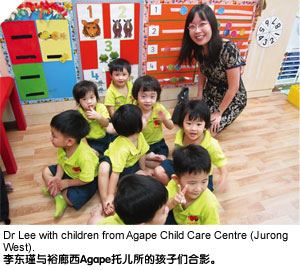
Explosive News for Singapore
At the National Day Rally in August last year, Prime Minister Lee Hsien Loong stressed the importance of early childhood education, and promised that the government will both invest a significant pool of resources into developing the early childhood sector, and establish a statutory board which will be responsible for all services pertaining to early childhood.
“Our goal is to let every child have the same opportunities from the start,” said Mr Lee.
On 27 March, the government established the Early Childhood Development Agency (ECDA), which will serve as the regulatory and developmental authority for the early childhood sector in Singapore, overseeing all aspects of children’s development below the age of seven, across both kindergartens and childcare centres. ECDA has five key areas of responsibility, which are: to oversee measures to raise quality standards of early childhood programmes, including regulation, quality assurance, and the provision of early childhood development resources; to facilitate the training and continuing professional development of early childhood professionals; to act as the master planner for infrastructure and manpower resources to support the early childhood sector; to provide subsidies and grants to keep quality pre-school programmes affordable, especially for low and middle income families; and to conduct public education and outreach to raise parents’ awareness and support for their children’s development.
Dr Lee Tung Jean (38 years old), previously the Director of the Energy Division at the Ministry of Trade and Industry (MTI), was appointed Chief Executive Officer of ECDA on 1 April of this year. Dr Lee holds a BA (Hons) from Harvard University, an MA in Economics from Yale University, and a PhD in Economics from the University of Oxford, which she pursued on a Rhodes Scholarship. Whilst her training in Economics may not seem to connect with early childhood education, it is this background that gives her the foundation to look at issues from a more holistic perspective and makes her appropriately placed to head ECDA in its development of the early childhood sector in Singapore.
EduNation interviewed Dr Lee late in April, just three weeks after the establishment of the Agency. Dr Lee talked about working with her colleagues who came from two different government departments, appropriately deploying the $3 billion allocated for early childhood education over the next five years, and how to comprehensively develop this sector in Singapore.
Comprehensive Plans for the Early Childhood Sector
The mission of ECDA is simple: a good start for every child.
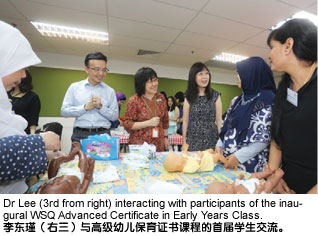 “We put the child at the centre of what we’re doing in the development of programmes and frameworks for the early childhood sector. We start off with the basis of what benefits the child, and then we work around that,” said Dr Lee. “We put the child at the centre of what we’re doing in the development of programmes and frameworks for the early childhood sector. We start off with the basis of what benefits the child, and then we work around that,” said Dr Lee.
In the past, early childhood education in Singapore was overseen by two different ministries. Children in kindergartens came under the purview of the Ministry of Education (MOE) while children in childcare centres were the responsibility of the Ministry of Social and Family Development (MSF). This division often left parents and operators at a loss. With the establishment of ECDA, the agency will now be responsible for the whole sector. It will also undertake the master plan for its development.
“With the entire pre-school sector — both kindergartens and childcare centres — coming under ECDA, we can undertake master planning in a more holistic way. We have a full overview of where the kindergartens and childcare centres are, and ascertain the profiles of families living in that area. Certain estates may have younger families, with young parents and their children. The more mature estates may have more old folks, and so there’s not as much need for childcare centres. Depending on the population profile, we can forecast the demand for childcare places.
“Our goal is to increase the cohort provision for childcare from one in three today to one in two within the next five years. That’s at the global level. But at the local level, for high demand housing estates like Punggol or Woodlands which have more young families, we are prepared to provide even more childcare places if that’s what parents need,” said Dr Lee.
The Acting Minister for Social and Family Development Chan Chun Sing revealed in Parliament in March this year that 15 new childcare centres will be built in Punggol New Town, adding to the existing 22 centres, while a further 10 centres will be set up in Woodlands.
On the rapid and huge increase in the number of childcare centres, Dr Lee said, “From an economic perspective, we hope to encourage married mothers to rejoin the workforce. We want to give parents the option to send their children to childcare centres where they can get good quality care and education. This way, parents can have peace of mind when they return to work.”
ECDA is staffed by about 150 professionals in different areas, most of whom were previously from MSF and MOE. They are divided into various core areas such as regulations and standards, professional development and infrastructure planning.
Dr Lee wants a good mix of people from each ministry within each group, and hopes that through their different experiences there can be cross-fertilisation and better generation of ideas.
In Charge of a $3 billion Investment over Five Years
In order to develop and improve early childhood education, the $3 billion investment in this area will largely be managed by ECDA.
“There are three main uses for this money, namely to provide for childcare subsidies, the Anchor Operators Scheme and setting up 15 kindergartens under the MOE. This last portion is managed directly by the MOE, while ECDA will administer the rest of the funds,” said Dr Lee.
With the government subsidy, low income families have access to affordable pre-school education for their children, with school fees taking up only five per cent of the gross family income, or as low as $5 a month. Although school fees are to be kept low, this does not mean that the quality is low. While ensuring that school fees are affordable for everyone, ECDA is also reviewing the standards of early childhood education.
“We have a framework called SPARK, which is the Singapore Pre-school Accreditation Framework. It was developed by MOE, but is now overseen by ECDA. We are looking into how we can enhance SPARK and make it more accessible to pre-schools,” added Dr Lee.
Introducing the Anchor Operators Scheme, Revising the Tender System
ECDA’s goal is to increase cohort provision for childcare to 50 per cent in five years’ time. This translates to an increase of 20,000 places from the current 92,000. If each childcare centre can accommodate 100 students, there will need to be 200 new childcare centres to be set up within the next five years.
To reach this number, ECDA needs to help childcare operators ramp up capacity. One key measure is through expanding the Anchor Operators Scheme.
Anchor operators in the early childhood sector may enjoy government subsidies for teacher salaries as well as for daily operating expenses. They may also enjoy preferential rates when it comes to rent at Housing Development Board (HDB) void decks. However, the barriers of entry are high. The anchor operator’s company needs to be a not-for-profit organisation, have a capital of at least $5 million and must not be affiliated with any religious or racial group. Currently the only two organisations that meet these anchor operators’ requirements are the PAP Community Foundation (PCF) and the National Trades Union Congress (NTUC)’s My First Skool. There are 1,051 childcare centres in Singapore, and 697 of them are privately-run — the other 354 are run by non-governmental organisations (NGOs) and the two anchor operators.
“PCF and NTUC make up 20 per cent of the market. We recognise that since we want to ramp up the number of childcare places quite quickly, it would not be fair to expect the existing anchor operators to shoulder all of the capacity expansion.
“In order to increase capacity quickly while keeping fees affordable, we need to bring in more anchor operators. Apart from introducing more competition, anchor operators can also learn best practices from one another,” said Dr Lee.
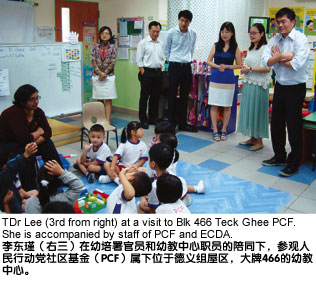 As for the number of anchor operator licenses it will grant, ECDA is keeping an open mind. As for the number of anchor operator licenses it will grant, ECDA is keeping an open mind.
“We do not have a specific number in mind. It depends on each operator and what they’re comfortable with. This is an investment decision best left to the operator. Different operators will have different financial models. Because some may have more economies of scale, they will be able to ramp up more aggressively while others may prefer to take a more moderate pace.”
On the $5 million capital an organisation needs before registering as an anchor operator, Dr Lee said, “PCF and NTUC run sizeable operations, and have thus been able to comply. We’re aware that certain organisations may have difficulty meeting this requirement, and are reviewing it accordingly.
“The underlying rationale is that we want to ensure there is stability to the operations, because we don’t want operators who may close down abruptly. This is very disruptive for young children, who will take time to adjust to new environments, as well as their parents,” added Dr Lee.
One-stop Centres
The most common family unit in Singapore is the dual-income small family. With both parents out working the entire day, the number of kindergartens with three to four hour programmes has stagnated while childcare services that provide whole-day programmes are in short supply, despite rapid growth in recent years.
ECDA is well aware of this trend. In order to lighten parents’ burdens and allow them to return to their jobs, providing kindergarten services alone is clearly insufficient. Childcare centres need to provide both comprehensive care and a holistic education. MOE has released a revised kindergarten curriculum framework in February this year which outlines broad principles, leaving room for early childhood specialists to implement their own teaching framework and teach their own curriculum and materials.
“It’s what we call holistic development. We should not over-emphasise the education component. Some parents are worried about academic issues, and whether their child is adequately prepared for Primary 1. The idea is to develop children through meaningful activities, and not just academically, but emotionally, socially, learning how to communicate, building their confidence and so on. These areas are also very important and will subsequently help them to become better learners when they are in primary school.
“We have curriculum specialists from MOE who are familiar with the mainstream education system. Their networks with the curriculum planning side of MOE allow them to work together in developing a seamless curriculum from pre-school to primary school,” added Dr Lee.
Affordable Childcare for Everyone
Last year, the Lien Foundation commissioned a report to benchmark early childhood education across 45 countries. The report, conducted by the Economist Intelligence Unit, found Singapore ranked 29th overall, and 21st for affordability.
After ECDA was established, one of its priorities was to expand the anchor operator scheme. Was this a move to adjust the 1:4 public to private ratio of kindergarten and childcare services so as to provide more affordable pre-school education?
“Affordability is definitely an important objective we are working towards. It’s not an easy target to achieve, because at the end of the day, childcare service provision is actually in the hands of the private sector and the VWOs (voluntary welfare organisations). The government does not have direct involvement in the running of centres,” said Dr Lee.
“Through the Anchor Operators Scheme, we’re trying to keep costs down. As part of the condition for them to come in as operators and to receive government funding, we will require them to meet quality and affordability targets, and they should also have a social mission.”
Increasing the number of anchor operators also achieves other aims.
“In time to come, we hope that anchor operators will make up a larger proportion of the market, and through them, influence the fees of other private operators. This is one way of signalling to the rest of the market what the appropriate fee benchmarks should be,” said Dr Lee.
Talks to Revise the Tender System for Childcare Centres
ECDA is in talks with the HDB to discuss the tender system for the lease of commercial sites for childcare centres to take into consideration non-price factors in the evaluation of the tender.
“We had feedback from operators that rental rates are high. This contributes to cost escalations. We are working with HDB to tender out commercial sites through a process that will consider the quality and affordability of the bidder’s proposal, not just price alone. This will make the evaluation process more complex, but we feel that the end outcome will be a more meaningful one.
“Ultimately the parents stand to benefit,” said Dr Lee.
Supporting a Diverse Early Childhood Education Landscape
Another of ECDA’s initiatives, on top of increasing the number of anchor operators, is to provide support to other pre-school operators who may have different business models. “Smaller players and niche operators will continue to have an important part to play in this whole ecosystem of childcare service providers. They can also contribute to raising the quality of our pre-school sector. The diversity of programme offerings provides parents with greater choice in their selection of pre-school programmes,” said Dr Lee.
“We are discussing how we can bring them on board, how we can incentivise them to invest more in capability building and expanding capacity where possible. Over the next few months, ECDA will be conducting consultation sessions and focus group discussions with the various operators to see what their needs and challenges are.”
Teacher Training Organisations
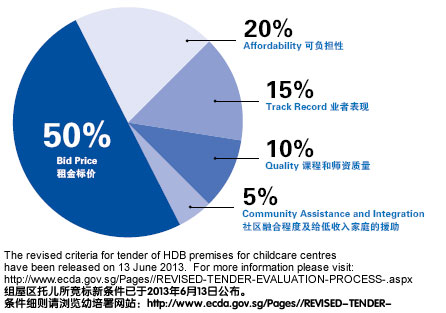 The childcare centres would be set up in vain if there were no qualified staff teaching the children. Therefore ECDA has to take care of both software and hardware. The childcare centres would be set up in vain if there were no qualified staff teaching the children. Therefore ECDA has to take care of both software and hardware.
With the increase of 20,000 new childcare places, there needs to be a corresponding increase in the number of early childhood educators. ECDA is in talks with teacher training organisations to ensure that there will be sufficient teachers to cope with the increase in childcare places.
“For pre-schools, training is done at a variety of institutions, including the polytechnics, like Ngee Ann Polytechnic and Temasek Polytechnic, as well as SIM University and private training providers like NTUC’s SEED Institute. We have to work with the various partners to make sure there are sufficient teachers, and that these teachers are sufficiently qualified,” said Dr Lee.
Review of Manpower Supply
Being an early childhood educator is not a popular choice as a career because of the perception that job progression is limited, and the salary is low. While the workload of early childhood educators is heavy, the salary is below that of other professionals with similar qualifications in other sectors. ECDA is looking into how to attract and retain good quality teachers.
“Adjusting salaries is a challenge. Unlike the case of teachers where the government is the main employer, we don’t pay the salaries of early childhood teachers. We can only work through our anchor operators, NTUC and PCF, and they in turn only make up 20 per cent of the market. We can’t force private operators to raise salaries when they are already facing rising costs on other fronts.
“Attracting good teachers goes beyond remuneration. The image and professionalism of the job are important considerations too. We are looking into how the various aspects of an early childhood professional’s job can be improved upon to make it more attractive for teachers to join the sector and stay in it,” said Dr Lee.
Raising Professional Standards and Career Prospects
ECDA is looking into building a continuing professional development framework to raise teachers’ professional standards and career prospects.
“We are taking reference from other professions, like doctors or lawyers, in drawing up this framework. Pre-school teachers will have a structured roadmap of courses and other forms of training to upgrade themselves.
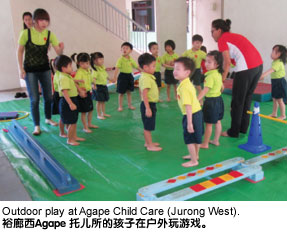 “First, we have to determine the different skill sets that are important for our pre-school teachers, map out the various career pathways, and then collaborate with training providers. At the start, we have to work more closely with the training providers, to design the programmes and curricula, or even pilot some courses ourselves. “First, we have to determine the different skill sets that are important for our pre-school teachers, map out the various career pathways, and then collaborate with training providers. At the start, we have to work more closely with the training providers, to design the programmes and curricula, or even pilot some courses ourselves.
“To ensure lasting benefits from the training courses, we will complement these courses with a mentoring system within the pre-schools so that teachers can continue to apply what they have learnt. We will also look into how we can facilitate the entry of mid-career teachers who wish to join the sector,” added Dr Lee.
Recruiting Foreign Teachers
Because of the shortage of early childhood educators, many service providers are recruiting foreign teachers to ease the manpower crunch. Dr Lee said that ECDA will approach this issue from a broader manpower perspective.
“We look at training, we look at bringing back mothers who are at home, so of course, we don’t want to close off any options, We are also considering the possibility of bringing in more foreign teachers, but we are conscious that in the pre-school sector, it is not so easy to substitute a foreigner for a local,” said Dr Lee.
“Because of the close interaction with children, parents would still be more comfortable with a teacher who understands Singapore. At the end of the day, pre-school education is about imparting not just knowledge, but values, and some values are unique to Singapore.
“Nevertheless, we recognise that foreign teachers can help alleviate the manpower crunch in targeted niche areas, like mother tongue language teachers. We are prepared to consider such requests.”
Early Childhood Conference
ECDA will organise the first Early Childhood Conference this year.
“For the first time we are bringing together the entire sector — both kindergarten and childcare. We’ll start off with a conference and then break up into parallel tracks of workshops, master classes and learning journeys. We’ll also be inviting overseas experts to share their expertise. In addition to childcare and kindergarten operators, we will have sessions catering to teachers and parents.
“There will also be the presentation of awards to recognise those who have contributed to the sector,” said Dr Lee.
She hopes that the professional image of pre-school teachers will be raised through this large-scale event. Some teachers may feel discouraged because they aren’t seen to be as important as mainstream teachers. The conference is one platform that ECDA will use to change that perception, boost morale and encourage more people to join the industry as pre-school teachers.
Educating Parents
Dr Lee is not only a Doctor of Philosophy in Economics but also mother to three children. As such, she feels that parents play an important role in their child’s early childhood education.
“Parents are role models for their children. They inculcate the love for learning in their offspring. To me, quality time with my children is very important
“Because I spend long hours at work, I make the most of my time with my children. Instead of sending them to tuition classes, I’d rather play with them or teach them myself. For example, through sharing stories of what they did in school, we can show an interest in our children’s activities. That already goes a long way towards giving children confidence, because they know they have someone cheering them on and supporting them in whatever they do.
“And that’s why as part of ECDA’s priorities, we are also trying to raise awareness among parents that they have an important role to play. It’s not just about sending the child to the right school or the right programmes, and putting expectations on the teachers that they will take care of the rest. When parents nurture their children themselves, they could be pleasantly surprised at how responsive their children are,” said Dr Lee.
Many parents may feel that children are hard to bring up, but children actually learn by example. Dr Lee has found that teaching by example works well with her children. As an ardent lover of music and a talented pianist herself, Dr Lee has continued to play the piano over the years, though more as a hobby now. She no longer gives public performances, except when serving as accompanist to her children when they perform. “I still play the piano because I love music. Seeing me at the piano, my kids asked me to show them how to play, so I was the first teacher for my children in terms of their musical journeys. But as they went along, and as they advanced, I didn’t have enough time to continue teaching them. They have since gone on to take lessons from other teachers, and even when they become better than I am, they still turn to me for advice.
“When children see that you do something for the love of it, they will come to enjoy it too, and because they are inspired, they will perform well. This is an important foundation for their learning journey, and something that parents can impart to their children from an early age. That is the message we want to convey to parents. We are looking into various platforms of communication — through the early childhood conference which will have a seminar for parents, through ECDA’s website, a magazine or even a phone app,” said Dr Lee.
While parents may have different priorities regarding how they want their children to be brought up, Dr Lee said that ECDA would accommodate this by adopting the approach of providing guidelines and resources to parents who wish to use them.
Understanding Parents
In order to provide meaningful support for parents, ECDA will first set out to understand their needs and interests.
“We will embark on a parenting study where we will reach out to parents through focus groups and a larger scale survey.
 “We want to find out from parents what their concerns and interests are, so that we can put out information that is useful to them. “We want to find out from parents what their concerns and interests are, so that we can put out information that is useful to them.
“We will also encourage childcare providers to set aside time for teachers and parents to come together so that they can discuss developmental objectives for the child. In this way, they can come to an agreement on what goals and expectations they want to set. Teachers and parents have to forge a partnership for the benefit of the child.”
What is greatly comforting is that the communication between teachers and parents has improved tremendously over the years.
There is a difference of about a decade between her eldest and youngest, and while all three of her children went to the same kindergarten she herself studied in, she has seen a world of difference in the ten years.
“At a recent parents-teachers meeting, the teachers shared with me a portfolio on my child — this is a file containing write-ups and photographs of my child at play, at work, interacting with friends, and various other occasions. It was presented clearly and systematically. For example, there were categories for emotional development, language skills, and the range of developmental domains. A lot of work must have gone into producing such a thorough portfolio. When I shared this with my colleagues in ECDA, they said that this has become a standard practice now for pre-schools.”
Improving the Early Childhood Environment
One cannot choose one’s parents, and some children don’t receive a good education because of their family backgrounds. The government has therefore decided to intervene and offer significant subsidies so that children from low-income families can also have the opportunity to grow up in a conducive learning environment.
“Another important mission of ECDA is to give every child a good start in life regardless of his or her background.
“Parents in Singapore, regardless of their income levels, are aware of the importance of education. They will save up all they can to send their kids for classes and tuition. I see many of my colleagues and friends who are more willing to spend on their kids than on themselves. But still, there are those who are either not aware or not in a position to help their kids. In such instances, we have more targeted outreach efforts to help these children.
“Through our pre-school database, we identify children who are not in pre-schools at five or six years old. After that, we partner with grassroots and social service organisations to go house to house, to engage parents or grandparents on the benefits of sending their children to school. Once they agree, we help to place them in a nearby childcare centre or kindergarten,” said Dr Lee.
Even after the children are successfully enrolled, they may not turn up for classes for various reasons. ECDA continues to follow up with these cases to address the issues that prevent the child from attending school regularly.
Eager to Contribute to Early Childhood Education
Dr Lee, previously the Director of the Energy Division at MTI, received notice of her new posting at the end of last year. This is her fifth rotation since she joined the civil service.
Some were initially surprised that a person with an economics background was chosen to lead ECDA, an organisation devoted to early childhood education. However, Dr Lee finds that she has been able to put her economics skills to good use in matters concerning regulations and infrastructure planning for the early childhood sector. “For this job, we need to have a breadth of experience, not just from the educational point of view, but also the ability to understand economic issues, social concerns, and other factors that shape the early childhood sector. The challenges facing this sector, from raising quality to addressing the manpower crunch, require solutions that are multi-disciplinary in nature.”
Dr Lee is excited about her new appointment, and looking forward to tackling these challenges.
“Having been posted to a number of ministries, I have learnt to adjust quickly to new challenges and portfolios. Since we are in the public service, the work we do ultimately benefits Singaporeans. This is what motivates me,” said Dr Lee.
Dr Lee, who has started to meet operators and other stakeholders in the early childhood sector, said, “I have enjoyed talking to early childhood professionals — those in my team at ECDA as well as others in the industry. I have met many like-minded people whom I can relate to and share their passion for uplifting the early childhood sector.”
Currently Dr Lee has an office at both ministries. At the end of this year ECDA will have a new office which will house all its employees under one roof. The location has yet to be confirmed, but Dr Lee revealed that ECDA’s new office will not be in a school.
Translated by: Lee Xiao Wen
|